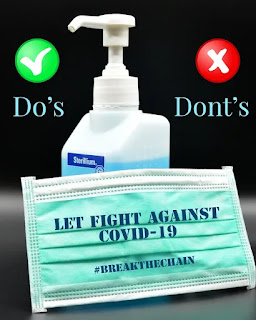Dos & Don’ts when you are ASYMPTOMATIC
In this tough phase, when every home has a patient suffering mildly or severely with the trendiest COVID-19 virus, we all have a fear inside while talking to anyone nearby living in same colony or living with us under the same ceiling or the one who just came from a visit to market. News today is the most frightening with the daily tolls of death in our own country, our own state, our own city or it could be someone close too.
But in spite of all we need to be safe and be particular about the safety of others too. The one who is reading this would be the one who is already a patient or one who is serving to a patient in their difficult times. Well all those the sufferers may get well soon and all those who are serving or in contact with any should follow the below guidelines as this page is meant for them.
People suffering from COVID-19 are classified in four classes:
1. Asymptomatic.
2. Mild to moderate symptoms.
3. Moderate to severe.
4. Critically ill.
Asymptomatic patients
Basically, patients who show no or mild symptoms of COVID-19 virus disease or have lived or are living with a diseased patient are called as asymptomatic patients. About 70%-80% cases reported till now were asymptomatic at there initial stage.
Since, they would give positive COVID report even if no symptoms are detectable; therefore they are called as patients. They are also called as silent carriers as they could infect any other person without being known that they are infected. Such types of patients can’t be easily identified.
For all asymptomatic patients out their, should follow the below guidelines, so that they don’t make any one else to suffer.
Dos:
• Proper diet should be followed which include several vitamins and nutrients.
• Junk food and other beverages from fridge or outside should be avoided.
• Fruits and vegetables should be preferred in plenty.
• Warm fluids should be prioritized over cold or chilled.
• Stay hydrated as much as possible.
• Multivitamins enriched with zinc and vitamin-C should be taken for at least 8-10 days.
• Proper isolation has to be done in a well ventilated room, as they could act as carriers for other healthy ones.
• Proper hygiene should be followed, like wearing mask at home too and washing or sanitizing hands every now and then.
• Regular monitoring of Oxygen Saturation Level should be done. It should be normally about 93-99%.
• Regular monitoring of body temperature is also necessary.
• Also, if possible blood pressure should also be kept in check. As usually, some of us may frighten up due to conditions at it may lead to severe rise.
• Adequate distance that is of about 3 feet has to be maintained.
• Outside the isolation room only and only one person should be in contact with the patient in order to serve him with food and necessities.
• Instead of watching news or anything related to corona tolls, prefer to watch comedy movies or any type of comedy shows or positive news or programs that demonstrate positive vibes. As laughter and positivity are incomparable therapies to overcome anything.
• The patient has to remain far from:-
Aged ones that is who are 65.
Patients of cardiovascular disease.
Chronic lung disease.
Cancer.
Diabetes.
Sickle cell disease.
Obesity.
Chronic kidney disease.
Or any pregnant woman.
Don’ts:-
The one who is suffering should not act irresponsibly to the above guidelines.
It’s unclear till now that how many or the percentage of among the asymptomatic patients who develops more infection of clinical disease. But all the ones who have lived or are living with an infectious patient should follow the points and they can also practice for the natural remedies listed in the previous blog at home so that they could develop immunity to fight against the virus.
The mild illness, the next stage can give the symptoms like fever, cough, sore throat, vomiting or diarrhea.
Any asymptomatic patient should visit the doctor or get treatment if:-
• They are more than 60 years of age.
• They are already a patient of any disease related to lungs, kidney, heart or immune dysfunction
• They are on oral steroids.
• They had gone through any organ or bone marrow transplant.
• They are going through chemotherapy.
• They are already suffering from diabetes or blood pressure.
Be safe, be at home.




Much needed information 👍🏽
ReplyDeleteThankyou Avinash.
DeleteVery helpful 👍🏽
ReplyDeleteVery helpful 👍🏽
ReplyDelete